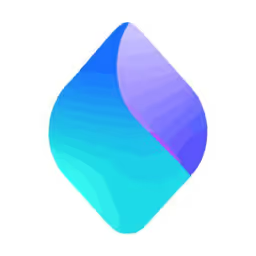Agentforce by Salesforce Alternatives
Find the right Agentforce alternative. We compare 10 different platforms to help you make an informed decision for your company.

Agentforce by Salesforce is a popular tool for many businesses, and for good reason. It performs well in automating tasks like sales follow-ups and document processing. Users often choose it for its strong capabilities in lead generation and customer interaction automation, making it a solid choice.
However, like any tool, it has some limitations. Some users report that seamless human escalation and tone customization can sometimes be a challenge. We've analyzed top alternatives based on G2 reviews to help you compare your options. Let's get started.
Consider 11x for Your Digital Sales Team
If your business needs digital workers for sales tasks, 11x is a relevant option. It is built to manage sales workflows and customer outreach. Schedule a demo to see how it performs and evaluate its fit for your specific operational needs.
11x is a GTM platform that uses AI agents to manage the sales process. Our agent, Alice, finds prospects, handles outreach, and updates your CRM. A second agent, Julian, qualifies inbound leads and books meetings.
The platform unifies functions like data enrichment, outreach, and email warmup. This removes the need for separate point solutions in your GTM stack.
Agentforce by Salesforce Alternatives
Below is a review of several alternatives to Agentforce. We will analyze their pricing, main features, and compare their advantages and potential drawbacks relative to Agentforce.
1) Zendesk Support

Zendesk Support is a service platform for customer and employee support. It uses AI agents and copilots with human agents to resolve requests from any channel. The platform works out of the box and does not require a large development team for setup.
Its use cases include automatic responses to high volumes of customer inquiries and suggestions for live agents. It can also function as an internal help desk to handle employee requests. The platform serves enterprise, small business, and startup companies across various industries.
Zendesk Support's Main Features
- Offers omnichannel ticketing that covers email, messaging, live chat, voice, and social media.
- Includes quality assurance functions to monitor and score agent interactions.
- Provides workforce management for staff forecasting and scheduling.
- Allows for the creation of a self-service help center and knowledge base.
How Zendesk Support Differs From Agentforce
Average Review Score: 4.3/5 stars based on 6,256 G2 reviews.
- Zendesk Support provides a unified omnichannel ticketing system that includes voice and social media. This offers more communication channels compared to Agentforce's focus on sales interactions.
- The platform works out of the box, which can mean a faster setup time than Agentforce. The latter may require more development resources for implementation.
- It includes a marketplace with over 1,200 applications for service teams. This provides more dedicated support integrations than the broader sales-focused ecosystem of Agentforce.
- This tool also serves as an internal help desk for employee support. This function is not central to the sales automation design of Agentforce.
Zendesk Support's Limitations Vs. Agentforce
- Zendesk Support focuses on customer service tickets, not sales process automation. Compared to Agentforce, it lacks dedicated features for lead generation and managing sales pipelines.
- The tool's native integration with other sales tools might be less deep than Agentforce's. Agentforce is part of the Salesforce ecosystem, offering a unified experience for sales teams.
- It is primarily built for reactive customer support. Some users may find its capabilities for proactive sales outreach, like finding new prospects, are less developed than Agentforce.
- The platform does not have specialized functions for sales document automation. Agentforce, in contrast, helps automate the creation and processing of sales-related documents for specific workflows.
Pricing and Cost Analysis
Zendesk Support lists its plans publicly, starting at $19 per user/month for the Team plan and going up to $115 for Enterprise. Agentforce does not provide public pricing, so a direct cost comparison requires contacting Salesforce for a custom quote.
2) Freshdesk
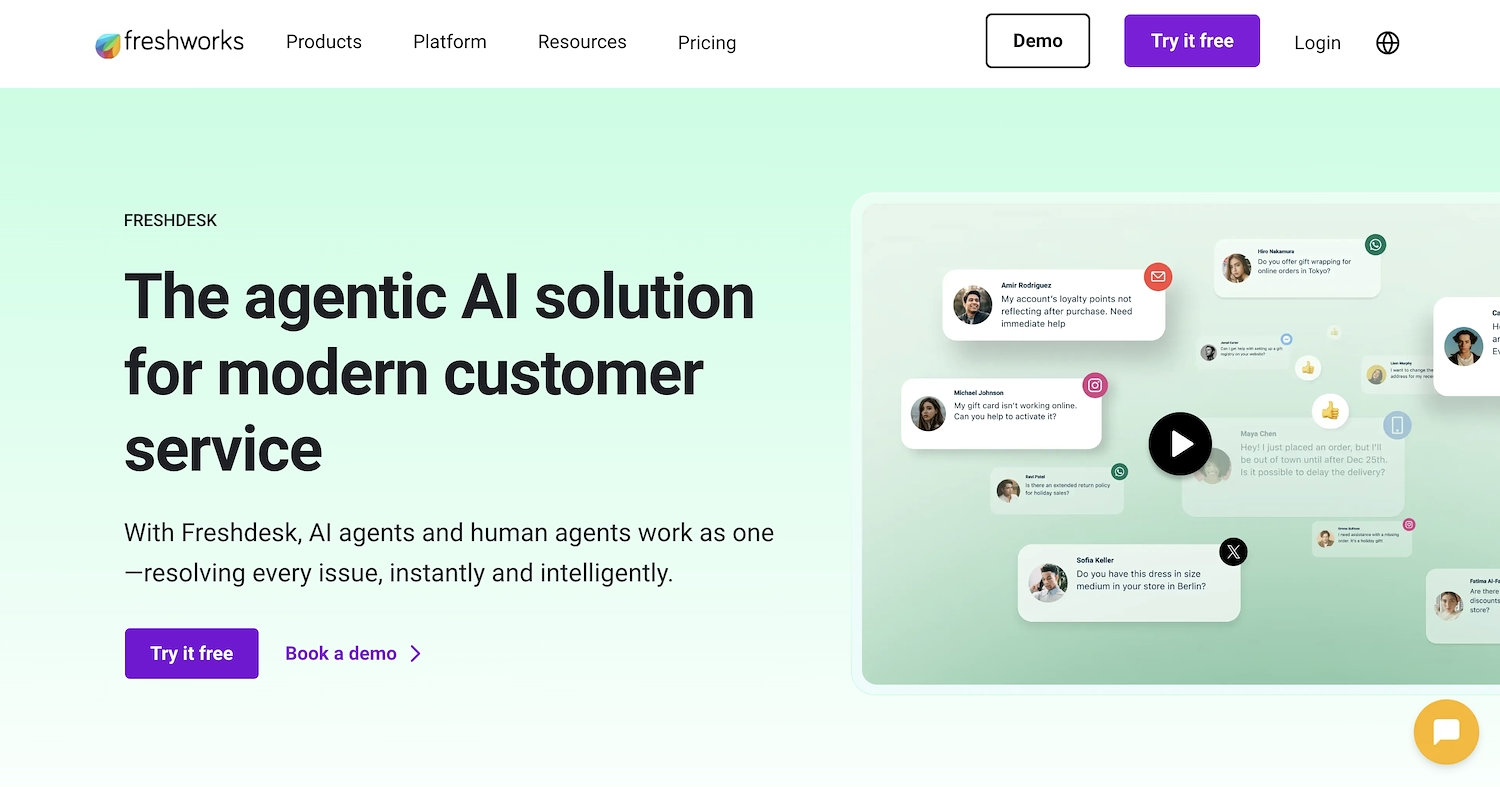
Freshdesk is a customer service platform that uses AI. It allows AI agents and human agents to work together. The system unifies support channels like email, chat, and voice into a single workspace for teams to resolve customer issues.
Its use cases include automatic responses to high-volume inquiries, such as order status or password resets. It also offers 24/7 conversational support on web and mobile channels for routine questions.
Freshdesk's Main Features
- Manages email, chat, social, and voice interactions within a single omnichannel inbox
- Allows for the creation of a branded self-service portal with a knowledge base, FAQs, and community forums
- Automates ticket assignment based on agent skills, workload, or customer sentiment
- Provides analytics to track metrics like CSAT, response times, and agent performance
How Freshdesk Differs From Agentforce
Average Review Score: 4.4/5 stars based on 3,552 G2 reviews.
- Freshdesk provides a free plan for startups and small teams. This offers a cost-effective entry point compared to Agentforce, which does not list public pricing and is aimed at enterprise sales workflows.
- The tool includes field service management capabilities. This allows businesses to coordinate support for technicians in the field, a function not native to Agentforce's sales-focused automation.
- It offers a shared inbox that unifies customer requests from email, phone, and social media. This provides a more collaborative support environment than Agentforce, which focuses on automating individual sales agent tasks.
- The platform allows for the creation of community forums. This gives customers a self-service option to find answers, a feature distinct from the direct sales engagement model of Agentforce.
Freshdesk's Limitations Vs. Agentforce
- Freshdesk's workflow centers on resolving support tickets. It lacks the end-to-end sales cycle management, from prospecting to outreach, that is central to Agentforce.
- Its AI capabilities focus on support tasks like ticket deflection. This is different from Agentforce, which uses specialized AI agents for proactive sales functions like finding prospects and qualifying leads.
- The tool's CRM integration usually logs customer service history. This contrasts with Agentforce's native updates, which track sales pipeline progression and lead status for sales teams.
Pricing and Cost Analysis
Freshdesk offers public pricing plans, from a free tier to an enterprise option at $79 per user/month. Agentforce requires contacting Salesforce for a custom quote, which prevents a direct cost comparison. For a full breakdown of its plans, visit Freshdesk's official website.
3) Intercom
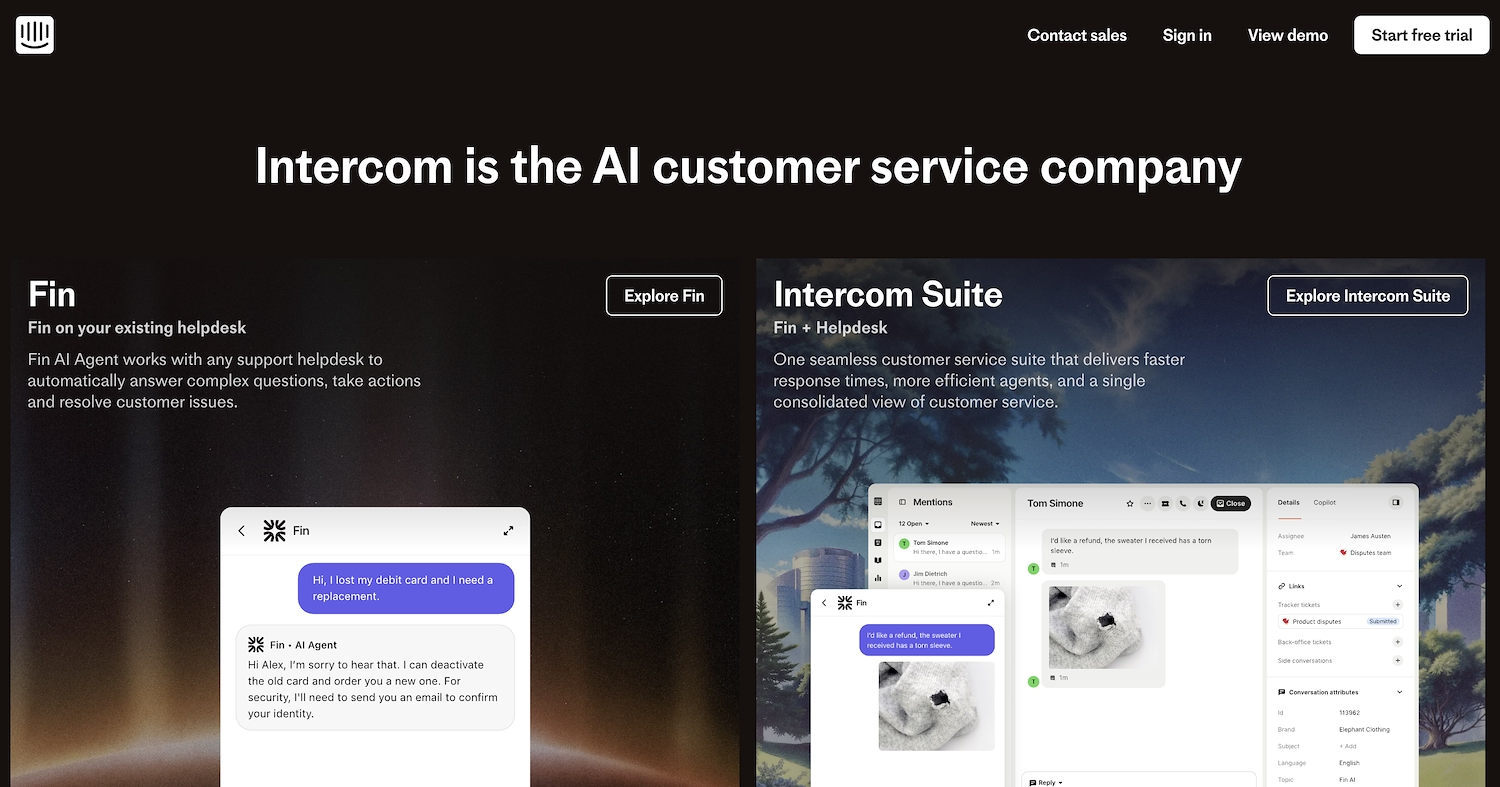
Intercom is an AI customer service company. It provides two primary offerings: Fin, an AI agent that connects to an existing help desk, and the Intercom Suite, a combined package of Fin and a help desk.
Fin works to answer complex questions and resolve customer issues without human help. The Intercom Suite offers a consolidated view of service operations to improve agent efficiency and response times.
Intercom's Main Features
- The Fin AI agent plugs into any existing support helpdesk to resolve customer issues without human intervention.
- Its AI automatically answers complex questions and takes actions on behalf of the agent.
- The Intercom Suite combines the Fin AI agent with a helpdesk in a single product.
- This suite provides a consolidated view of customer service operations to improve agent efficiency.
How Intercom Differs From Agentforce
Average Review Score: 4.5/5 stars based on 3,490 G2 reviews.
- Intercom's Fin AI agent plugs into existing helpdesks like Zendesk or HubSpot. This provides more integration flexibility than Agentforce, which is native to the Salesforce ecosystem.
- The tool focuses on resolving customer service issues automatically. This differs from Agentforce, which automates sales tasks like prospecting and outreach.
- It offers a no-code workspace to train and deploy the AI. This can make the setup process simpler compared to Agentforce, which may require more development work.
- The platform has a per-resolution pricing model. This cost structure is different from Agentforce, which typically uses custom quotes based on user licenses.
Intercom's Limitations Vs. Agentforce
- Intercom's AI is engineered for customer service resolutions. It lacks the specific design for sales cycle automation, like prospect discovery or sales outreach, which is central to Agentforce's purpose.
- The platform's per-resolution pricing model is designed for support ticket volume. This may create unpredictable costs for sales teams, unlike the typical per-user license structure of sales tools like Agentforce.
- While Intercom connects to data sources, its actions focus on support tasks like refunds. It does not have native functions for sales-specific actions, such as lead score updates, that Agentforce provides.
Pricing and Cost Analysis
Agentforce requires a custom quote, while Intercom offers a usage-based model at $0.99 per resolution or a per-seat plan from $29 per month. Intercom's transparent pricing suits predictable workloads, while Agentforce's custom quotes are for enterprise needs. Check detailed pricing on Intercom's official website.
4) HubSpot Service Hub
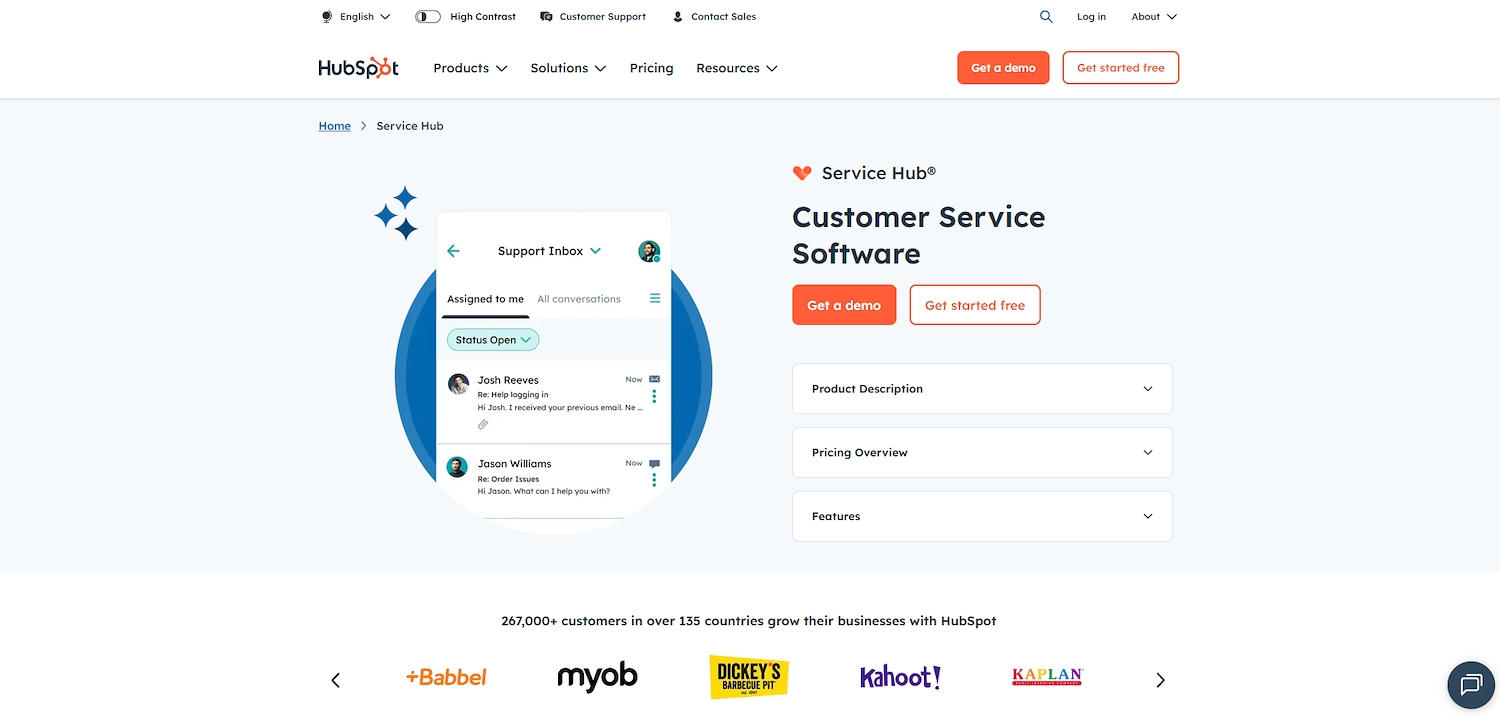
HubSpot Service Hub is a customer service software on the HubSpot CRM platform. It brings all service data and channels into one place to scale support. The system uses automation for ticket routes and follow-ups. Other tools include a shared inbox for inquiries, a knowledge base for self-service, and surveys to collect customer feedback. Reports track team performance and satisfaction.
HubSpot Service Hub's Main Features
- Includes a customer success workspace that provides health scores, playbooks, and book-of-business views.
- Manages feedback collection through Net Promoter Score (NPS), CSAT, and other custom surveys.
- Provides conversation intelligence using AI for call analysis and to generate coaching insights.
- Offers a secure customer portal for users to view and manage their own support tickets.
How HubSpot Service Hub Differs From Agentforce
Average Review Score: 4.4/5 stars based on 2,547 G2 reviews.
- HubSpot Service Hub provides a customer success workspace with health scores and playbooks. This helps teams manage customer retention, which is different from Agentforce's focus on the pre-sale cycle.
- It includes built-in tools to manage customer feedback through NPS and CSAT surveys. This function is for service quality measurement, a feature not central to Agentforce's sales automation design.
- The platform uses conversation intelligence to analyze calls for agent coaching. This contrasts with Agentforce's AI, which automates sales tasks like prospecting and outreach.
- This tool offers a secure customer portal where users can view and manage their support tickets. Agentforce does not have a comparable self-service portal for sales interactions.
HubSpot Service Hub's Limitations Vs. Agentforce
- HubSpot Service Hub centers on customer service tasks. It does not have native tools for proactive sales functions, such as prospect discovery, which is a core feature of Agentforce.
- Its AI capabilities focus on resolving support inquiries. This is different from Agentforce, which uses specialized AI agents to automate sales outreach and qualify leads for sales teams.
- The tool's workflow automation is built for support ticket routing. Some users may find it less suited to manage complex sales cycle stages compared to the dedicated sales workflows in Agentforce.
Pricing and Cost Analysis
HubSpot Service Hub has public pricing, with a free plan and paid tiers ranging up to $150 per month. Agentforce, in contrast, requires a custom quote for its enterprise-focused solution. For detailed costs, visit HubSpot Service Hub's official website.
5) Zoho Desk
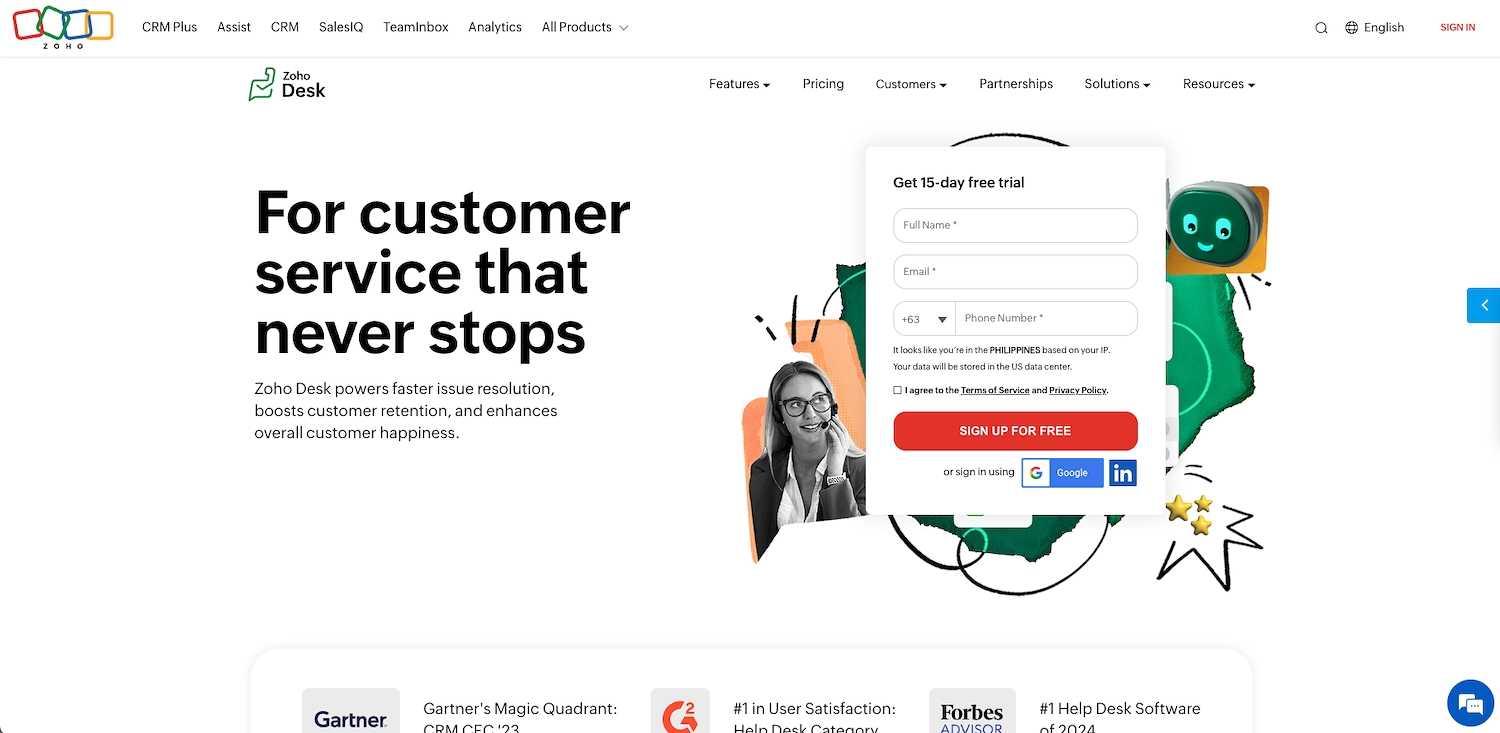
Zoho Desk is a customer service platform from Zoho. It gives support teams a system to manage customer conversations from multiple channels. The software helps businesses track and resolve support tickets.
Its use cases center on the organization of customer inquiries and team collaboration for contextual responses.
Zoho Desk's Main Features
- Uses Zia, an AI agent, for autonomous ticket handling, sentiment analysis, and anomaly detection.
- Unifies support channels such as email, live chat, social media, and phone into a single console.
- Offers a Radar manager app for real-time monitoring of service operations on mobile devices.
- Supports multi-brand and multi-department workspaces in more than 40 languages.
How Zoho Desk Differs From Agentforce
Average Review Score: 4.4/5 stars based on 6,639 G2 reviews.
- Zoho Desk uses its AI, Zia, for support functions like sentiment analysis and anomaly detection. This is different from Agentforce, which uses AI for sales tasks like finding prospects.
- It offers a mobile app, Radar, for managers to monitor service operations in real time. This provides a different kind of oversight compared to Agentforce's focus on sales workflow automation.
- The platform supports multi-brand and multi-department workspaces in over 40 languages. This offers more localization for global support teams than Agentforce's sales-centric structure.
- This tool provides a unified view of customer conversations from many channels for team collaboration. This is distinct from Agentforce, which automates tasks for individual sales agents.
Zoho Desk's Limitations Vs. Agentforce
- Zoho Desk is built for customer service tickets. It does not have the sales process automation that Agentforce provides, such as tools for lead generation or managing sales pipelines from start to finish.
- Its AI capabilities focus on support tasks like ticket deflection. This is different from Agentforce, which uses specialized AI agents to proactively find prospects and qualify leads for sales teams.
- The tool's workflow automation is built for support ticket routing. Some users may find it less suited to manage complex sales cycle stages compared to the dedicated sales workflows in Agentforce.
Pricing and Cost Analysis
Zoho Desk offers transparent pricing with a free plan and paid tiers ranging from $14 to $40 per agent/month. Agentforce does not publish its pricing and requires a custom quote. This makes Zoho Desk a more predictable option for businesses of all sizes, while Agentforce's model is better suited for large enterprises with specific needs.
Schedule a Demo With 11x
For sales teams interested in digital workers, 11x offers a focused solution. Its AI agents are built for go-to-market functions like finding prospects and booking meetings, allowing your team to concentrate on higher-value activities.
Schedule a demo to see how the platform performs with your specific sales process. This provides a direct look at its capabilities and how it can integrate with your current operations.
With 11x, we use AI to run your sales playbook. Our agent Alice finds accounts, enriches data, and drives outreach. Julian qualifies prospects and schedules meetings. The platform unifies functions like intent signals and email warmup, removing the need for extra tools.
Book a demo to see it in action.
6) ServiceNow Customer Service Management (CSM)
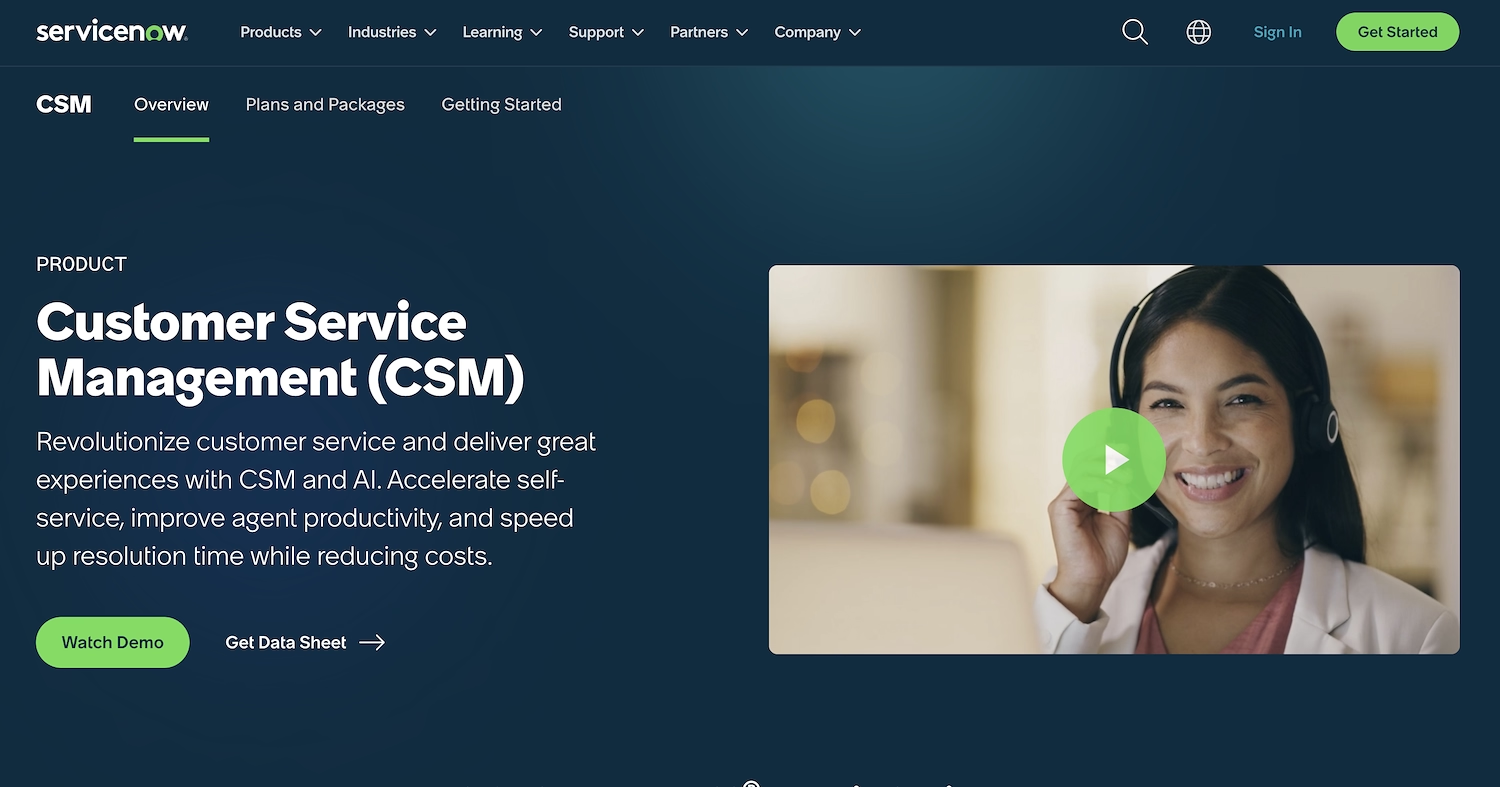
ServiceNow Customer Service Management (CSM) manages customer service requests that require work across departments. It connects teams to resolve complex issues from start to finish. The system can notify customers about potential problems and works to fix them before the customer is aware of an issue.
ServiceNow Customer Service Management (CSM)'s Main Features
- Provide AI-powered self-service through conversational chat, a service portal, and an engagement messenger for embedded help.
- Use AI agents to autonomously complete routine tasks and generate case summaries, recommended actions, and knowledge articles.
- Offer a unified agent workspace with a configurable desktop, an omnichannel view of the customer, and guided playbooks.
- Manage cases with a unified data model and automated workflows that span across different departments.
How ServiceNow CSM Differs From Agentforce
Average Review Score: 4.4/5 stars based on 228 G2 reviews.
- ServiceNow CSM manages workflows that span across departments to resolve complex issues. This provides a more integrated approach to customer problems than Agentforce's sales-specific automation.
- The tool proactively identifies and resolves potential issues, often before a customer is aware of a problem. This contrasts with Agentforce, which automates sales processes rather than preemptive customer service.
- Its AI agents create case summaries and suggest actions for support staff. This differs from Agentforce's AI, which is built to find prospects and automate sales outreach.
- The platform offers a unified agent workspace that gives a complete view of the customer. This is distinct from Agentforce, which automates individual sales tasks rather than providing a consolidated service console.
ServiceNow CSM's Limitations Vs. Agentforce
- ServiceNow CSM is built for customer service, so it does not have native tools for proactive sales functions. For example, it cannot automatically find new prospects or generate leads in the way Agentforce does.
- The tool's automation centers on support ticket routing and case resolution. Some users may find it lacks the specialized outreach capabilities required for sales campaigns, a core feature in Agentforce.
- Its AI capabilities focus on service-related tasks, like summarizing cases or suggesting resolutions. This is different from Agentforce, which uses AI agents specifically to manage the sales cycle from prospect discovery to lead qualification.
Pricing and Cost Analysis
Both Agentforce and ServiceNow CSM require custom quotes for their enterprise-focused solutions. A direct cost comparison is not possible without contacting each vendor for pricing tailored to your specific business needs.
7) Genesys Cloud CX
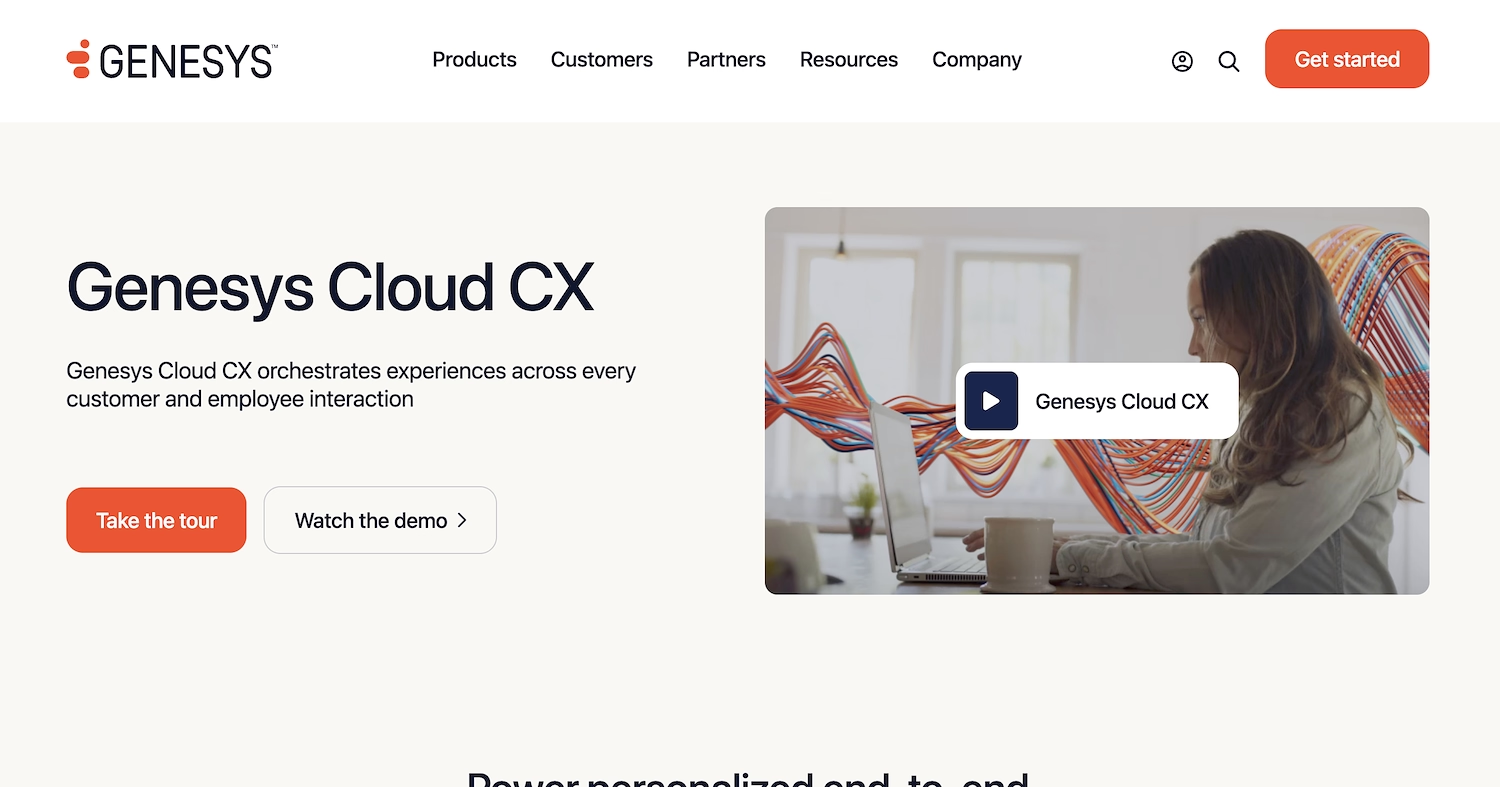
Genesys Cloud CX is a contact center platform for customer and employee experiences. It unifies communications from channels like voice, text, and social media into a single interface. The system manages customer interactions and connects them with the appropriate agent or information.
Its use cases cover customer service and sales support. The platform uses AI to help orchestrate the customer journey, a function relevant for businesses that explore AI SDR roles.
Genesys Cloud CX's Main Features
- Offers workforce engagement management tools for agent coaching, quality assurance, and performance tracking.
- Uses AI to orchestrate customer journeys across both digital and voice channels.
- Provides predictive routing to match customers with the best-suited agent based on defined criteria.
- Includes speech and text analytics to identify customer sentiment and intent from conversations.
How Genesys Cloud CX Differs From Agentforce
Average Review Score: 4.4/5 stars based on 1,432 G2 reviews.
- Genesys Cloud CX includes workforce engagement management tools for agent coaching and quality assurance. This offers structured performance monitoring, while Agentforce automates sales tasks.
- The platform uses predictive routing to connect customers with the most suitable agent. This differs from Agentforce, which automates sales outreach instead of managing inbound customer matching.
- It offers speech and text analytics to identify customer sentiment from conversations. Agentforce's AI, in contrast, is designed for sales functions like lead generation.
- This tool uses AI to manage customer journeys across channels, a broader scope than Agentforce's focus on automating the pre-sale cycle.
Genesys Cloud CX Limitations Vs. Agentforce
- Genesys Cloud CX centers on customer service interactions. It lacks the native sales automation tools for lead generation and pipeline management that Agentforce provides.
- Its AI capabilities focus on orchestrating customer journeys. This differs from Agentforce, which uses AI agents to find prospects and automate sales outreach.
- The platform's workflow automation is built for routing inbound customer contacts. Some users may find it less suited for managing the pre-sale cycle compared to the dedicated sales workflows in Agentforce.
Pricing and Cost Analysis
Both Agentforce and Genesys Cloud CX require custom quotes for their solutions. A direct cost comparison is not possible without contacting each vendor for pricing tailored to your specific business needs.
8) Five9
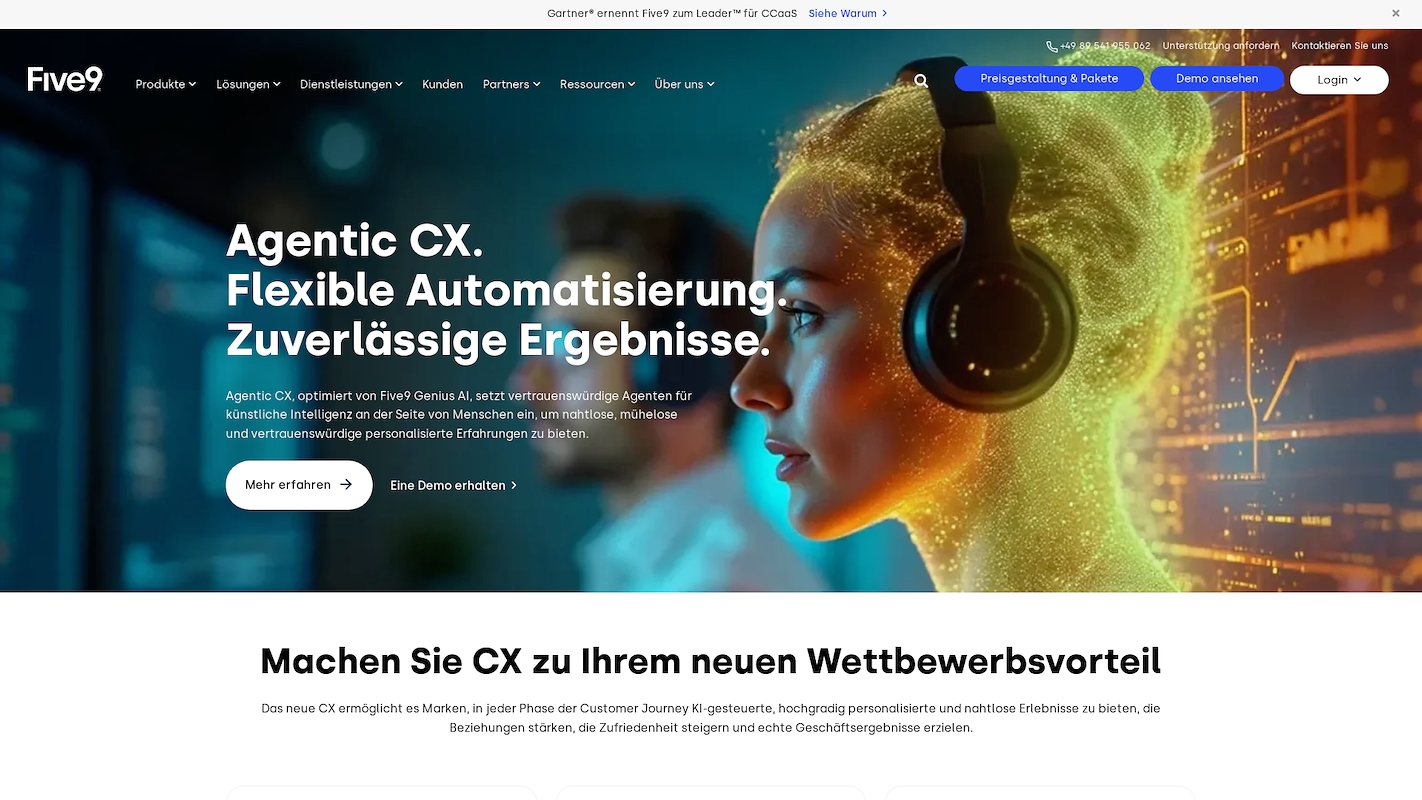
Five9 is a cloud contact center platform. It unifies customer interactions from channels like voice, email, and social media. The system supports sales and service operations through a single interface.
Its use cases include outbound sales campaigns and lead qualification. The platform also uses AI to automate certain tasks and provide assistance to agents for high-volume communications.
Five9's Main Features
- Manages interactions across voice, social, and email channels.
- Routes and queues incoming sessions and enables concurrent calling.
- Offers session summary notes and provides administrator access for control.
- Includes reporting and dashboards to monitor contact center metrics.
How Five9 Differs From Agentforce
Average Review Score: 4.1/5 stars based on 533 G2 reviews.
- Five9 manages customer interactions across voice, social, and email channels. This provides a broader communication scope for both sales and service teams compared to Agentforce's focus on sales process automation.
- The tool enables concurrent calling for outbound campaigns. This feature is designed for high-volume contact centers, which is different from Agentforce's automated sales outreach.
- It includes session routing to direct incoming customer contacts to the right agent. This function supports inbound sales and service, while Agentforce automates proactive outbound sales tasks.
- The platform provides session summary notes for agent reference. This is slightly different from Agentforce, which focuses on updating the CRM with sales pipeline status rather than summarizing individual interactions.
Five9's Limitations Vs. Agentforce
- Five9 does not have a dedicated AI agent for autonomous prospect discovery. This is different from Agentforce, which uses its AI to find new leads for the sales pipeline without manual intervention.
- The tool's design centers on contact center operations. Some users may find it lacks the end-to-end sales cycle automation, from lead generation to closing, that Agentforce provides.
- Its AI capabilities focus on assisting human agents and automating contact center tasks. This contrasts with Agentforce's specialized AI agents that autonomously qualify leads and book meetings for the sales team.
- The platform does not offer native features for sales document automation. Compared to Agentforce, it lacks the ability to automatically process sales-related documents as part of a workflow.
Pricing and Cost Analysis
Both Agentforce and Five9 require custom quotes for their solutions. A direct cost comparison is not possible without contacting each vendor for pricing tailored to your specific business needs.
9) Talkdesk
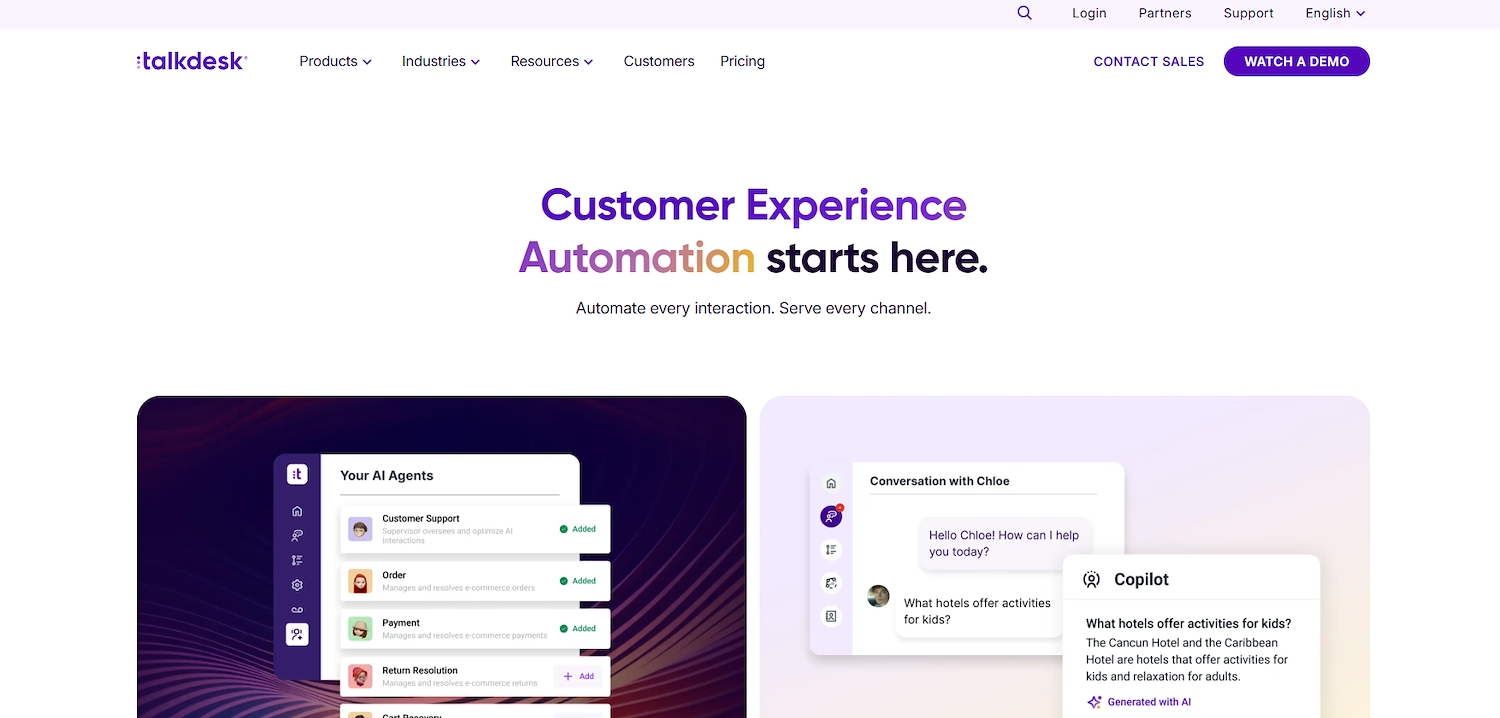
Talkdesk is a cloud contact center platform that uses AI to unify customer service and sales. The system automates customer journeys and provides self-service options for common questions.
Its tools for agent assistance support sales development. They handle initial interactions and qualify leads before a person takes over. This process is relevant for teams that explore AI SDR roles.
Talkdesk's Main Features
- Manages customer interactions across voice and email channels.
- Routes and queues incoming sessions for agents.
- Enables concurrent calling to support high-volume communications.
- Includes reporting and dashboards to monitor contact center metrics.
How Talkdesk Differs From Agentforce
Average Review Score: 4.4/5 stars based on 2,431 G2 reviews.
- Talkdesk enables concurrent calling, which supports high-volume outbound campaigns for sales and service teams. This is different from Agentforce's focus on automated, individual sales agent tasks.
- It offers prebuilt AI agents for specific industries like healthcare and financial services. This provides more specialized support compared to the broader sales automation functions of Agentforce.
- The platform includes a data cloud that analyzes call recordings and transcripts for insights. This is a different approach from Agentforce, which primarily updates the CRM with sales pipeline status.
- This tool routes incoming customer sessions to the appropriate agent. This function supports inbound sales and service, while Agentforce automates proactive outbound sales tasks.
Talkdesk's Limitations Vs. Agentforce
- Talkdesk is not built for autonomous prospect generation. This is different from Agentforce, which uses a dedicated AI agent to find new sales leads without human input.
- The platform's primary function is contact center management. Some teams may find it does not cover the entire sales process, from initial prospecting to outreach, in the way Agentforce does.
- Its AI is designed to support human agents or automate customer service journeys. This is a different approach from Agentforce, which deploys autonomous AI agents to manage specific sales tasks like qualifying leads.
- The system does not include features for sales document processing. Agentforce, in contrast, can automate the creation and handling of sales-related documents within its workflows.
Pricing and Cost Analysis
Talkdesk offers public pricing plans from $85 to $145 per user, per month, providing cost predictability. Agentforce requires a custom quote, a model better suited for large enterprises with specific needs, which prevents a direct cost comparison.
10) LiveAgent
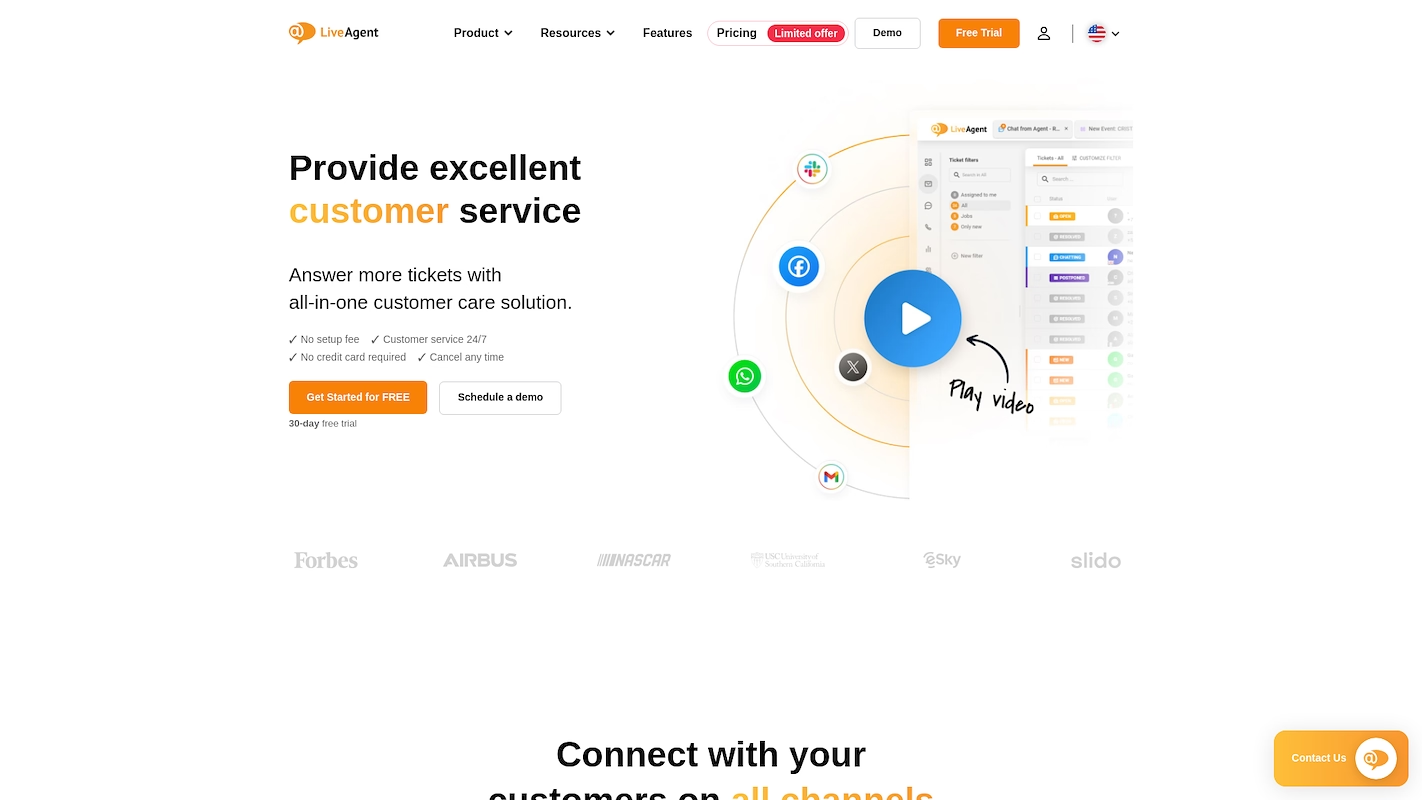
LiveAgent is a customer support platform that unifies communication channels into a single system. It provides a shared inbox for agents to manage customer conversations. The software helps organize inquiries for sales and service teams, a function that can support initial contact similar to an AI SDR.
LiveAgent's Main Features
- Combines email, voice, social media, and chat into a universal inbox.
- Includes agent rating and gamification to monitor team performance.
- Organizes tickets using departments, priorities, statuses, and custom rules for routing.
- Offers a customer knowledge base with live suggestions and feedback forms.
How LiveAgent Compares To Agentforce
Average Review Score: 4.5/5 stars based on 1,514 G2 reviews.
- LiveAgent includes agent rating and gamification features to monitor team performance. This is different from Agentforce, which automates sales tasks rather than tracking support agent metrics.
- The platform provides a universal inbox that combines email, chat, and social media. This offers a unified support view, while Agentforce focuses on automating individual sales workflows.
- It allows for the creation of a customer knowledge base with live suggestions. This self-service function is distinct from Agentforce's design for proactive sales outreach.
- This tool offers a startup program with free access for six months. This is more accessible for new businesses than Agentforce's enterprise-focused custom pricing.
LiveAgent's Limitations Vs. Agentforce
- LiveAgent is built for customer service and lacks the sales process automation found in Agentforce. For example, it does not have a dedicated AI agent for autonomous prospect discovery for the sales pipeline.
- The tool's automation rules handle ticket routing and organize support inquiries. This is different from Agentforce, which uses AI to manage sales-specific tasks like lead qualification and to book meetings.
- Some teams might find that the platform does not offer native features for sales document automation. Agentforce, by comparison, helps automate the creation and processing of sales-related documents for specific workflows.
Pricing and Cost Analysis
LiveAgent offers transparent pricing plans ranging from $15 to $69 per agent, per month. Agentforce does not publish its pricing and requires a custom quote. This makes LiveAgent a more predictable option for businesses that need clear costs, while Agentforce's model is suited for large enterprises with specific requirements.
Which One Should You Go With?
Choosing an Agentforce alternative depends on many factors, including your specific business needs and existing tech stack. This guide reviewed several options to help you evaluate which platform best fits your operational requirements.
If your focus is on automating sales processes, 11x offers a platform with AI agents built for go-to-market functions. Its agents handle tasks like prospect discovery and meeting scheduling, allowing your sales team to focus on closing deals.




